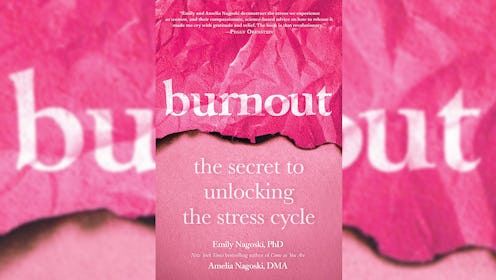Books
Women Experience A Different Kind Of Burnout — This Book Tells You How To Fight It

If you're a millennial, you've probably heard about how your entire generation is burned out. You know that you have been short-changed by the generations that come before you. You and your peers are buying fewer houses, getting married later, and waffling on whether you want children because your salaries are lower and your prospects for employment are poorer than they were for your parents. It’s a systemic, rather than a situational problem, and it’s unsustainable.
These are all things you hear about every day (along with talk about every industry millennials are killing). What you don’t know is how to deal with it. That's where Burnout: The Secret to Unlocking The Stress Cycle comes in.
While countless articles and books have been written on the "problems" of the millennial generation, few have offered practical solutions. How can you deal with this burnout in a healthy and productive way? How can you get back to living our lives instead of drowning in you perceived failures?
Written by sisters Emily and Amelia Nagoski, Burnout lays out the complex reasons behind burnout and how to tackle them head-on, and it's specifically aimed at women. While men have to deal with stress and burnout as well, of course, it’s different in character and degree than the expectations placed on women.
Both Emily and Amelia have extensive experience with burnout. Emily has a PhD in health behavior, while Amelia has quite a bit of personal experience with burnout in the "man’s world" of conducting of classical music.
The fact is, women are expected to be perfect mothers, to be there for every occasion, and to "lean in" at work to correct for systemic failings. Women are expected to climb the career ladder, find a partner, get married, and have children, when many have trouble just finding well-paying work. Women are expected to keep their homes clean and tidy, make nutritious meals, go to the gym four times a week, keep up with personal grooming, have an immaculate appearance (complete with perfect hair and a slender and fit body), enrich their minds, be helpful, and more, all with a smile.
How are you supposed to deal with all of this? The answer, unsurprisingly, is that many women aren’t. That’s what the Nagoski sisters are trying to change.
The key to burnout is actually quite simple: Stress is a cycle. There’s nothing inherently wrong with feeling stressed out. The problem is, because of the expectations heaped upon you, you often can’t complete the stress cycle in response to aggressors. You can’t yell at the colleague who talks over you in a meeting and steals your ideas. You can’t punch the guy who groped you on the Metro.
(Well, you can do these things, but you probably shouldn’t for your own personal safety, if nothing else.)
Because you can’t complete the response cycle and bring these events to a conclusion, thereby releasing the tension from you bodies, you internalize the stress. And when stress builds upon stress, guess what happens?
Burnout.
What really makes Burnout a necessity for any millennial woman is its practical approach. There are worksheets, checklists, and more sprinkled throughout the book in order to help you manage your stress response cycle. The book acknowledges that there’s no one-size-fits-all solution for this problem. Maybe self-care is the answer for you, or maybe trying to find time for it causes even more stress. Maybe hitting the gym is cathartic, or maybe, as one of the examples given in the book, you would rather be burnt out than incorporate exercise into a daily routine. The point is to utilize their strategy and make it work for you, in any way you can. The authors don’t give you homework, and they don’t place additional expectations on your shoulders. You’re free to take as much or as little as you need to; it’s a resource, not another stressor.
Burnout excels in its intersectionality. The world is hard for any woman. But certain marginalizations — your skin color, your sexual orientation, your size — can make it even more difficult for certain people. The Nagoskis take these aspects of privilege into account, writing an inclusive narrative that does it best to incorporate as many millennials as possible.
A primer on how to stop letting the world dictate how you live and what you think of ourselves, Burnout is essential reading. It’s easy to talk about the power of positive thinking, but you're probably your own worst critics. So how do you go easy on yourself and stop internalizing judgments and holding yourself to unattainable standards? It’s not easy, as the Nagoski sisters make clear, but it is possible. And, frankly, it’s necessary.